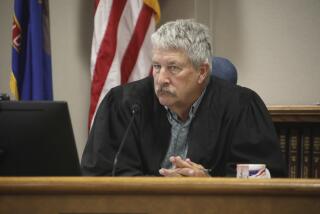Estranged Wife Awarded Custody of Frozen Embryos
- Share via
MARYVILLE, Tenn. — In a decision that could have far-reaching ethical, medical and legal implications, a Tennessee judge Thursday awarded custody of seven frozen embryos to a wife embroiled in a divorce case, ruling that “human life begins at conception.”
Circuit Court Judge W. Dale Young ruled the fertilized eggs should go to Mary Sue Davis, who wants to implant them and carry them to term--against the wishes of her estranged husband, Junior Lewis Davis.
At a news conference in Titusville, Fla., where she now lives, Mary Sue Davis, 28, said: “I’m thrilled. It’s absolutely what I wanted.”
Junior Davis, 30, told reporters on the courthouse lawn here that he will appeal the ruling. “I have to stand up for my rights as a male,” he said.
Throughout the case, he has asserted that he should not have to father a child against his will, while his wife has claimed that the embryos are alive and that she has a right to decide whether to carry them to term.
Mrs. Davis said she would not try to get pregnant until January. “I’m waiting to see about the appeal, then hopefully after that try to have a child,” she said.
Young’s 57-page decision rejected the husband’s argument that the embryos are property, concluding that implantation “serves the best interest of these children.’
The decision was hailed by anti-abortionists and deplored by abortion rights activists. Kate Michelman, executive director of the National Abortion Rights Action League, said the decision has “dangerous implications for reproductive freedom in America,” and called it “ludicrous” to say that life begins at conception.
Nancy Myers, media relations director for the National Right to Life Committee, said her organization was “thrilled” by the decision, adding: “Once society recognizes the fact that human life begins at conception, killing these human beings at will through abortion is clearly unacceptable.”
Legal scholars on Thursday noted that the ruling opens the way for furious debate centering on the question of when life begins. The ruling also focuses attention on whether modern reproductive technology needs more precise guidelines and on how the courts will handle similar in-vitro cases in the future.
“We’re in the middle of a vast societal discussion over embryos,” said Lori Andrews, an attorney who is a legal expert on reproductive technologies. “I don’t think this is the last word on it.”
Several Issues Open
Indeed, the judge left open several thorny issues, including whether Junior Davis would be liable for child support if any babies were born, how custody would be determined and what would happen to any embryos left frozen in the event Mary Sue Davis had several children and then decided she wanted no more.
In an interview, the judge attempted to distance his decision from the abortion issue and denied that his personal views on abortion--which he refused to reveal--influenced his ruling.
Young said that he relied more heavily on expert witnesses than on the Davises themselves. His decision indicated that he was influenced by the testimony of Dr. Jerome Lejeune, director of the French National Center of Scientific Research, who testified that a human being is created as soon as an egg is fertilized.
Recalling Lejeune’s testimony that upon fertilization “a man is a man,” Young wrote in his opinion that the testimony “stands unrebutted in the record.”
At one point the judge wrote in answer to the question of when life begins: “The court finds and concludes that human life begins at the moment of conception, that Mr. and Mrs. Davis have accomplished their original intent to produce a human being to be known as their child.’
9-Year Marriage
The couple, who have been married about nine years, had tried and failed for years to have children. She had five tubal pregnancies before turning to in-vitro fertilization, in which eggs are fertilized outside the body and then implanted in the uterus.
Six in-vitro attempts failed, as did an effort to adopt a child, and last December the Davises decided to try a new cryopreservation program in which nine eggs were inseminated. Two of them already have been implanted--with no success--and the remaining seven are in storage. In February, Junior Davis filed for divorce; neither he nor his wife will discuss the details of their breakup.
According to Charles Clifford, Junior Davis’s lawyer, the judge’s decision will not become final until Oct. 23. Clifford said he will seek a restraining order to prevent any implantations in the meantime.
Mary Sue Davis has said the in-vitro procedures have taken a heavy toll on her physically and that her “time is running out” for having babies. But Junior Davis told reporters Thursday that his wife could remarry and is “very capable of going through this process again.”
Their closely watched dispute drew vast attention, evidenced by the throng of reporters and television technicians who waited for the judge’s decision to be filed Thursday. One woman wore a T-shirt that read: “Site of the Historic Maryville, Tenn., Frozen Embryo Battle.”
Poses Contradiction
Alexander M. Capron, a professor of law and medicine at USC who is a leading authority on biomedical ethics, said the ruling poses a contradiction between treating embryos “as human beings on one hand and not treating them as children on the other hand.” Capron asserted that following the judge’s reasoning, guardians should be appointed to assure that all the embryos are treated fairly. For example, “Who should be picked first” for implantation? Capron asked.
But Judge Young, in the interview, said: “I’ve done my job, and I feel very comfortable about having done my job. And that’s where I’m going to let this problem stay.”
More to Read
Sign up for Essential California
The most important California stories and recommendations in your inbox every morning.
You may occasionally receive promotional content from the Los Angeles Times.










